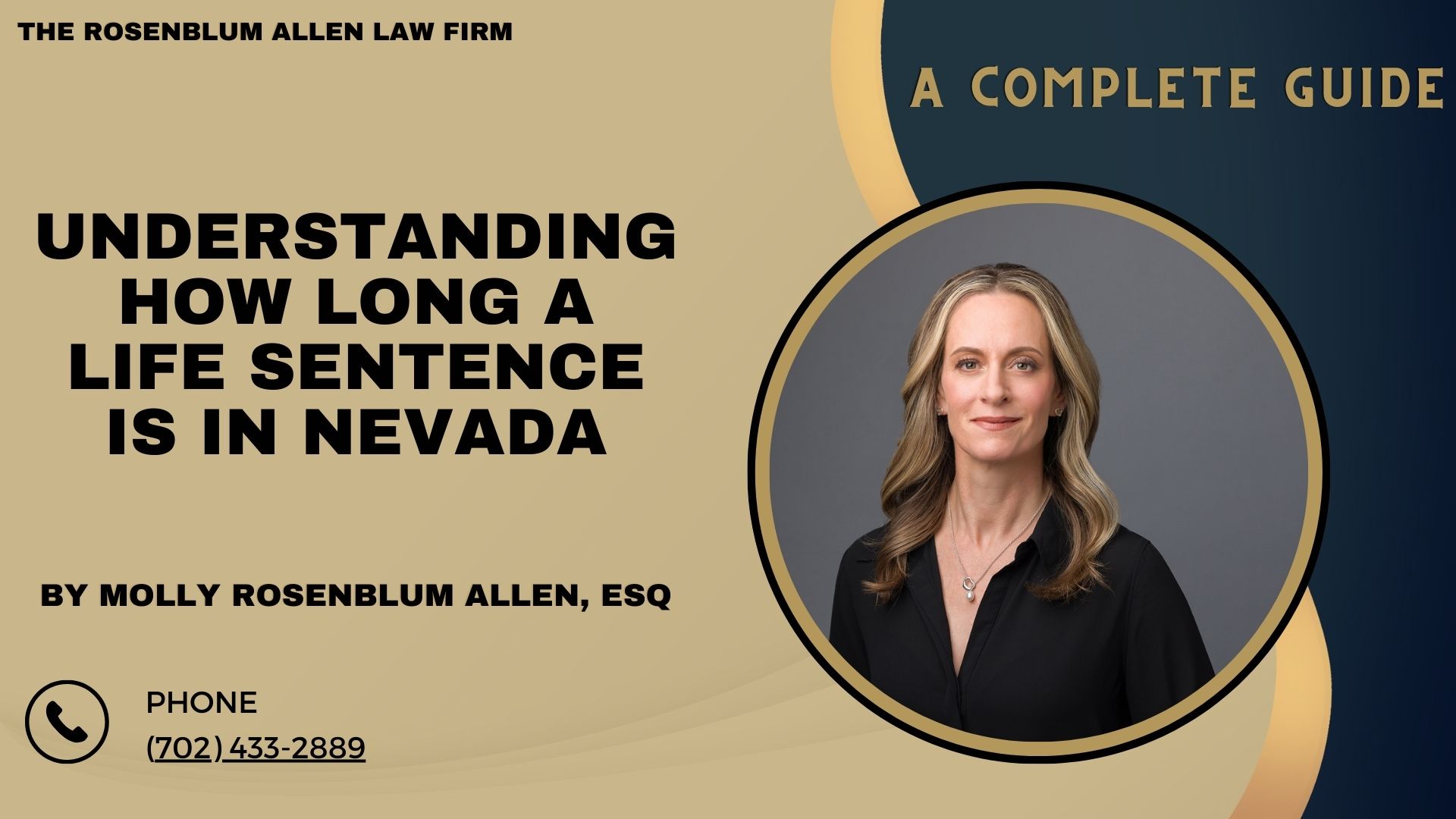A life sentence in Nevada means spending years in prison. You must spend this time before being eligible for parole. Unlike other states, Nevada abolished life without parole sentences. Authorities can release individuals sentenced to life imprisonment. But, parole is not guaranteed.

 Definition of a Life Sentence
Definition of a Life Sentence
In Nevada, a life sentence means imprisonment for the entirety of a person’s natural life. However, those sentenced to life are eligible for parole after a minimum number of years.
Life sentences in Nevada do not have the possibility of unconditional release. The person remains under supervision for life if paroled.
Life sentences are considered indeterminate sentences. This means they have a minimum and maximum term rather than a set of years.

Determinate vs. Indeterminate Sentencing
Determinate sentences specify a precise number of years in prison. For example, if a person receives a ten-year sentence, they will be jailed for exactly ten years.
Indeterminate sentences provide a range between a minimum and maximum number of years. Life sentences fall under this category.
Indeterminate sentences have an advantage. Parole is possible after the minimum term if the inmate shows rehabilitation.

Minimum Time Served for Life Sentences
In Nevada, the minimum time served on a life sentence depends on the crime committed. The minimum term ranges between 10 to 20 years before parole eligibility.
Factors Affecting Minimum Time Served
Several key factors determine the minimum time that someone must serve on a life sentence.
The type of crime committed affects the sentence. Murder, sex offenses, and crimes against children have longer minimums.
Criminal history – Prior felonies and violent crimes add time.
Aggravating factors – Things like using a weapon, premeditation, or victim injuries.
Mitigating factors – Lack of priors, good behavior, remorse. These may reduce time.
For example, a first-time murderer may serve 10-15 years. But, someone with priors convicted of child sex abuse could serve 20+ years. Judges weigh the case specifics when setting minimum parole eligibility.

Mandatory Minimum Sentences
Some crimes are severe. These include murder, sex trafficking, and battery with a deadly weapon. They carry mandatory minimum sentences. These sentences are set by Nevada law. These require serving extra time on top of the standard minimum for a life sentence.
Mandatory minimums range from 2 to 20 years added. So that’s more time a person must serve before even being eligible for parole on their life sentence.
Judges cannot reduce mandatory minimums. They also cannot suspend them, no matter the case’s circumstances. They are “fixed” extra punishments.
Possibility of Parole
In Nevada, most lifers can get parole after serving the minimum time for their crime. However, parole is not guaranteed.
Factors weighed by the parole board include:
Behavior and rehabilitation efforts in prison
Remorse and accept responsibility
Plans for employment and housing if released
Risk for re-offending
Inmates must convince the board they are ready for parole. There is no entitlement to release after serving the minimum term. If the board feels the inmate is unready, they can require the inmate to serve more time.

Meaning “Life” in Life Sentences
In Nevada, a life sentence does not always mean someone will spend their whole life locked up. The possibility of parole exists after the minimum term is served.
However, the parole board has complete discretion over release. They can decide if an inmate serves more than the minimum. They can do this if they feel more rehab is needed.
Some key points:
Parole possibility reduces after age 60. The board may see little point in release if someone is older.
Violent offenders often serve more than the minimum before parole.
The average person convicted of murder serves 20-30 years despite shorter minimums.
Indeed, “life” in prison is still possible if the board feels the inmate can never be safely released.
Information for Families and Friends
If you have a loved one serving a life sentence, don’t lose hope. Maintain contact and be a positive influence. Here are some tips:
Write letters regularly to provide emotional support.
Visit when you can to lift spirits. Phone calls also help.
Put money in their prison account for necessities and comforts.
Encourage participation in rehab programs to build their case for parole.
Hire an attorney to help navigate the parole preparation and hearing process.
Always remain calm at hearings – outbursts or emotions can hurt their case.
Understand most inmates serve past minimums, so prepare for a long journey.
Why You Have Not Hired a Felony Defense Attorney Yet
Watch this short video to take the next big step toward defending your rights against a felony charge.

Breaking It All Down
In summary, a Nevada life sentence means the chance for parole. But, it’s not guaranteed. It must serve a minimum number of years before it comes. The minimum term ranges from 10 to 20 years. It depends on factors like crime, criminal history, and mandatory minimums.
Once the minimum requirement is satisfied, individuals may consider parole as an option. But, the parole board has complete discretion. They consider behavior, rehabilitation, remorse, and public safety risks. Inmates must convince the board of their readiness.
A Nevada life sentence offers some hope of release after years. But, it could still mean dying in prison if the board does not grant parole. Families can provide critical support to lifers as they work towards possible parole. The dream of freedom can become a reality with proper preparation and representation.

More Frequently Asked Questions
What’s the difference between life with and without parole?
In Nevada, all life sentences come with the possibility of parole. However, in some other states, life sentences may be without the chance for parole.
Who decides the minimum sentence length?
Judges have the authority to determine the minimum sentence within a specified range based on the severity of the crime and other relevant factors.
Can the minimum time served be reduced?
Typically, the minimum sentence remains as determined by the judge. However, certain circumstances or mandatory enhancements may extend the minimum time served.
What factors may hinder parole eligibility?
Behaviors like misconduct or violence while incarcerated, lack of remorse, refusal to engage in rehabilitation programs, and objections from the victim’s family can all impact parole chances.
How can parole eligibility be enhanced?
Positive behaviors such as adherence to prison rules, active participation in counseling and education programs, expressions of remorse and acceptance of responsibility, and the development of a solid parole plan can all improve eligibility for parole.
Can parole be denied even after serving the minimum sentence?
Yes, the parole board holds the authority to deny parole if they believe more time is necessary for rehabilitation or if public safety is a concern, even after the minimum sentence has been served.


Additional Resources for You
For our readers seeking comprehensive legal guidance and information, our lead attorney, Molly Rosenblum Allen, Esq., has compiled a valuable set of resources covering a range of relevant legal topics. These resources are designed to assist you in understanding your rights and the complexities of the law during challenging times. Here’s a list of articles and their direct links that you might find helpful:
Double Jeopardy: Understand the intricacies of double jeopardy as it applies to Nevadans with this thorough review. Learn More
Hung Jury: Find out what a hung jury means in Nevada and how it could affect your case. Discover the Facts
Circumstantial Evidence: Explore the role of circumstantial evidence in legal proceedings with this in-depth article. Get Informed
Indicted vs Charged: Clarify the difference between being indicted and being charged in the state of Nevada. Understand the Differences
Difference Between Jail and Prison: Learn about the distinct differences between jail and prison that could impact you or a loved one’s situation. Get the Facts Right Here
What Are Miranda Rights: Know your rights when it comes to Miranda warnings and how they protect you during police interactions. Find Out Right Here
How to Check if You Have an Outstanding Warrant: This guide will help you understand the steps to take if you suspect there’s a warrant out for your arrest. We Can Help
What to Look for in a Criminal Defense Lawyer: Choosing the right attorney is critical. Here’s what to consider when seeking a criminal defense lawyer in Nevada. Choose Wisely
Possible Ways to Reduce a Felony Charge: There may be avenues to lessen the severity of a felony charge. Explore your options with this insightful piece. Explore Your Options
Should You Accept a Plea Bargain?: Before making a decision on a plea bargain, read this article to understand the potential benefits and drawbacks. Get the Facts Here
Each of these resources is meticulously prepared to provide you with the knowledge you need to navigate the legal system with confidence. Whether you’re facing a specific legal issue or simply wish to educate yourself about the law, Molly Rosenblum Allen, Esq. is committed to offering guidance and support through these informative articles.

Outside Resources for You
Nevada Department of Corrections – The state agency that runs Nevada’s prison system. Provides information on sentences, parole, and inmate resources.
Nevada Attorney General – The state’s top legal officer provides information on criminal law and the justice system in Nevada.
Nevada Legislature – The official site of the Nevada Legislature contains state laws and statutes on sentencing and parole.
Nevada Parole Board – Learn about the board’s membership, hearings process, and how decisions are made.
Clark County District Attorney – The DA’s office for Las Vegas prosecutes state crimes and outlines sentencing laws.
American Bar Association – National lawyer organization with public resources on criminal defense and sentencing.
Prison Fellowship – Nonprofit with programs to help families of inmates including those serving life sentences.

A Special Message from Our Lead Attorney, Molly Rosenblum Allen, Esq

Dear Reader,
Thank you for reading. The information is helpful. It is about life sentences in Nevada. I know these legal issues can be complex and confusing to navigate. I aim to use these resources to bring clarity about this topic. I want to help anyone facing a potential life sentence.
If you have more questions, or would benefit from speaking with a knowledgeable Las Vegas criminal defense attorney, I encourage you to schedule a free meeting. Feel free to call my firm directly at (702) 433-2889, and my team can get you booked for a phone or in-office meeting.
These cases have high stakes and are very fact-specific. So, the best way I can help is to sit down with you. We will evaluate the details and provide effective advice. Don’t hesitate to reach out. I’m here to protect your rights and interests at this difficult time.
Sincerely,
Molly Rosenblum Allen, Esq.



